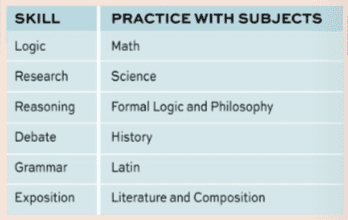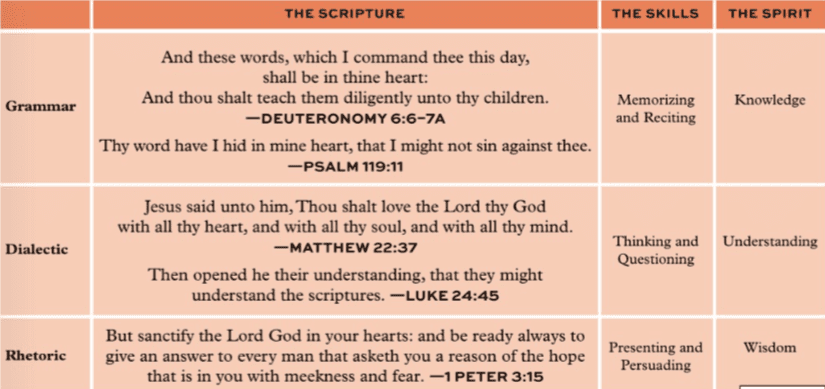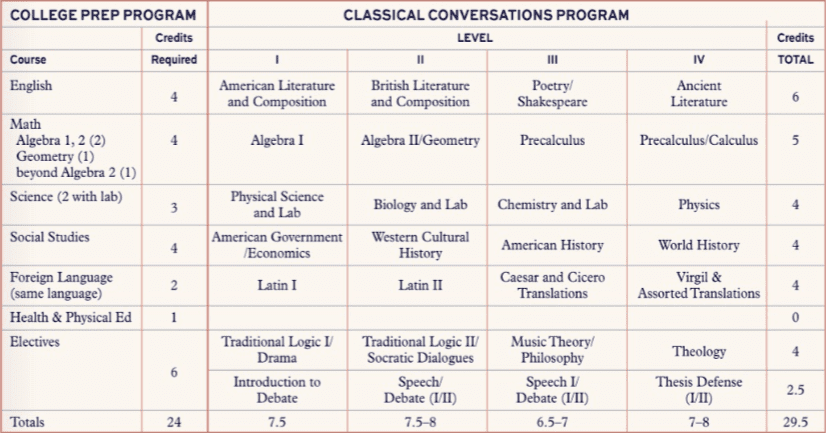The high school years raise a lot of questions for families. Families in public schools may wonder if the school system has lost something vital to education—a reason for being, perhaps, or a sense of purpose and belonging. Meanwhile, homeschool parents may ask themselves whether homeschooling is really a viable option for secondary schooling; after all, isn’t the content more difficult, aren’t extracurriculars even more important, and can homeschool students truly get into college? Perhaps the most common question any parent asks at this stage is, “How do I homeschool through high school?”
In this article, we’ll explore those questions and more. But first, we’ll just point out that homeschooling is a dynamic, flexible, and effective paradigm that naturally extends into the high school years. Families that embrace homeschooling during this period of life find themselves well-equipped with the tools to succeed in college and beyond.
Before we jump into the how, let’s take a look at why you should consider homeschooling your student through the high school years.
The Why: 7 Benefits of Homeschooling in High School
The upsides to homeschooling through high school are numerous.
- Academics: In study after study, homeschooled students come out on top in college entrance exams. Homeschooled high schoolers are likely to score 15 to 25 percentage points above their public-school peers.
- Lifelong Learning: Homeschooling fosters an environment where students actively engage with the content, which promotes logic and critical thinking. Independent learning not only prepares students for higher education but also equips them with skills necessary for lifelong learning.
- College: If your student is college-bound, higher education recruiters and admissions departments pursue homeschool students who not only have exemplary test scores but demonstrate independent learning skills and take education sincerely.
- Flexibility: This is a benefit of homeschooling in general, but you’ll find that the Classical Conversations Challenge programs allow for adjustments and pacing, which is especially crucial when homeschooling through high school. Since Challenge programs meet once a week, there are plenty of days available for students to complete their assigned coursework, volunteer, attend church events, practice violin, learn auto repair—the options are nearly endless!
- Learning at Your Own Pace: Additionally, we are strongly committed to parents retaining authority over students’ coursework and grades. If your student needs to brush up on skills that are lagging or missing, you have the freedom to scale the assignments to their ability. Of course, this also allows for space to fill in the missing pieces. And the opposite is also true. Parents can adapt to accelerated learners in a variety of ways, whether it’s concurrent enrollment in CC Plus, or internships, apprenticeships, and opportunities like mentorship.
- Personalized Learning: Does your student have a passion for web design, French cooking, or animal husbandry? Of course, there are limitless hobbies and interests for homeschool students! Related to the flexibility already mentioned, homeschooled high school students have a unique opportunity to specialize in particular disciplines.
- Faith: Education should center upon the good, the true, and the beautiful. Christ-centered homeschooling integrates faith with learning, which in turn offers students a clearer understanding of God and His creation and allows students to articulate that understanding. (In fact, that’s Classical Conversations’ entire mission: “to know God and to make Him known.”) Also, according to a 2015 study, homeschoolers are less likely to leave their faith than their public school peers.
The Parenting Advantage
Further, homeschooling through high school graduation is deeply humanizing. Parents are the experts on their children. They are the coaches, trainers, supporters, and essentially co-laborers in their family’s educational journey. Moms and dads encourage strengths, guide, teach, drill, instruct, and shepherd their children. Skills and subjects are not separate from souls.
Students are loved whether they succeed or fail. Sure, parents are fallible and must regularly confess their shortcomings. But, most do so with the understanding that they are raising their children for heavenly citizenship.
“Families are designed to nurture the minds, wills, and emotions of its members so that the barriers created by fear of the unknown can be replaced by the confidence that comes from knowing you are loved whether you succeed or fail.” —Leigh Bortins, Classical Conversations founder and chief visionary officer
The How: Getting Started on the High School Home School Journey
Getting started is easy! There are a few steps you’ll want to take early on as you create a plan to homeschool.
- Check your state’s laws regarding homeschooling.
- Choose a method that aligns with your values and goals.
- Select a program that matches your preferred method.
- If you’re thinking about college, start planning ahead—it’s never too early!
Once you’ve done your research, you can select a program and execute your plan with even greater confidence. (And it’s even easier to get started with Classical Conversations. We’ll lay out those steps later in this article.)
Let’s take a look at each step in detail.
Research Your State’s Homeschool Laws
Homeschooling is legal in every state across the US. However, each state has its own set of laws regulating homeschooling. You can find your state’s laws using HSLDA’s handy map of homeschooling laws by state.
Choosing the Right High School Homeschool Method
We’ve gone over homeschool methodologies extensively in another post, which we strongly recommend reading. Suffice it to say here that homeschooling methods are not a theoretical concern—they have immense practical implications in how you’ll actually homeschool. There’s a world of difference between traditional, online homeschooling and, say, the Montessori method.
Of course, we strongly recommend the classical, Christian approach. This approach seeks not only to impart academic knowledge but also to instill virtues, values, and a strong moral foundation. Classical education, with its focus on the trivium (grammar, logic, and rhetoric), provides a structured framework for intellectual development. Simultaneously, weaving Christian principles into the fabric of education ensures that spiritual growth is an integral part of the learning journey.
The Classical Conversations Challenge Program
Once you’ve found a method that works for you, you’ll want to select a program that aligns with your chosen methodology.
Classical Conversations follows the classical, Christian approach. Of course, there are other programs that also use this method. What sets Classical Conversations apart?
(First, a brief word on Classical Conversations lingo: our programs for ages 12+—programs that correspond with the high school years—are called Challenge programs. Challenge students attend communities led by parents, Tutors, and Directors.
Classical Conversations provides a structured curriculum for each Challenge level. Subjects are referred to as “strands” and in addition to measurable assignments that translate well into scope, sequence, and schedules, students focus on skills that produce disciplined thinkers.)

The Why of the Challenge Program
God is the center of all knowledge, and participating in the Challenge program to homeschool through high school is modeled around this principle. Each Challenge level is curated to satisfy academic requirements, but most importantly, to train students in Christian virtue.

The How of the Challenge Program
Students sincerely appreciate meeting weekly to engage in inquiry, discussion, and presentation that are rooted in the core subjects. Guided by themes grounded in virtue, students enjoy increasing ownership and expanding responsibility for productivity and personal growth.
You’ll notice in the wheel above that three quadrants are organized by the trivium, a defining characteristic of classical education. The Challenge program orders itself by viewing each subject in the context of all creation, connected to its Creator. As Christians, we assert that we live in a knowable universe, and we both learn and teach our children about God’s world and His word; as we journey towards high school graduation, we impress this upon our hearts.
Classical Conversations members have the added benefit of our online searchable tool, CC Connected. With digital and practical resources, including online forums, we’re just a swipe away to help you best homeschool your high schooler!
Key Takeaways
- Tutors, parents, and students discover that all knowledge works together in an indivisible universe rather than a disconnected multiverse.
- Through discussions, community members make connections between science, math, philosophy, theology, history, literature, and economics.
- Classical Conversations families model a lifelong love of learning about God through His Word and His world.
- Tutors encourage families to explore how knowledge glorifies God, increasing their desire to worship Him and serve Him.
With classical and Christ-centered bearings, parents and students alike reap the rewards of homeschooling through high school that point to eternal matters as well as here-and-now advantages.

Preparing for College
We’ve also covered college prep extensively in other posts. You’ll want to check these articles out in particular:
- “Can Homeschoolers Go to College?”
- “The Top 5 Skills College Students Need to Thrive”
- “How to Go to College for Free”
- “Why and How to Choose a Christian College”
- “4 Easy Steps to Make a Homeschool Transcript”
Now let’s take a look at how Classical Conversations, in particular, prepares Challenge-level students for college.
College-Ready with Classical Conversations
Though Challenge students share common strands every year to address subjects, there are many varieties of transcripts as each graduate has his or her own unique arrangement of supplemental for-credit learning.
We provide starter resources that incorporate specialized terms related to classical Christian curriculum during Challenge I–IV. These include:
- A table of high school credits (see image below).
- A choice of transcript systems to create, complete, and store academic credit.
- Access to a sending service for official transcript documents
- A guidance counseling forum that includes fellow parents who have walked a similar path

Access to these member resources is found in CC Connected.
We also recommend Solid Rock Consulting services for guidance counselors who have special experience with Classical Conversations high school families and who respect parents’ own authority over their home schools.
High School Testing Requirements
Some states require annual standardized testing for homeschool students. Classical Conversations members enjoy a discount on annual membership to the Homeschool Legal Defense Association. HSLDA will assist you in understanding your state’s testing requirements.
Additionally, we encourage you to explore the Classic Learning Test (CLT), which provides an assessment that seeks to reconnect knowledge and virtue and is accepted by more and more colleges. CC members qualify for a 25% discount with CLT.
Issuing a High School Diploma
Finding help for issuing a high school diploma is easy for CC members. Classical Conversations offers an annual high school commencement experience each spring. Presented by the non-profit Classical Conversations Foundation, pomp and circumstance fills the air at a formal graduation ceremony with student and family recognition.
Graduates receive a diploma provided by Homeschool Diploma, and you can determine on whose wall it belongs—yours or theirs!
How to Homeschool through High School with Classical Conversations
- Join a local Classical Conversations community!
- Follow the curriculum:
- CC provides a structured curriculum for each academic subject for each Challenge level.
- Complete resource lists accompany each level, which include required textbooks, reading materials, resources for discussion, and assignments.
- Participate in weekly meetings:
- Challenge programs meet once a week for thirty weeks.
- Parents are encouraged to attend as Challenge Directors facilitate groups of up to twelve students.
- Supplement with independent study:
- Although not a requirement for graduation from the Challenge program, consider disciplines like physical education, music lessons, drama, robotics, and more. The list is expansive!
- Encourage areas of interest, pursue internships, mentoring, or concurrent enrollment for college credit.
- Optional: Prepare for college admissions.
- Ensure students meet college admission requirements and are prepared for the standardized admissions test as needed.
- Keep records, prepare transcripts, and assist with applications.
Remember the Highest Aim of Homeschooling through High School
We raise our sons and daughters to become brothers and sisters in Christ. Parents have the divinely appointed duty to love and train their children in the way they should go, embodying Christ’s love in all things and in every circumstance. Just as we commit to studying God’s Word personally and as a family throughout our lives, we should apply this to our high school students’ years.
You are already well on your way! As a parent, you have been influencing your child from his or her arrival. Classical Conversations believes that you are the very best educator for your child.
Yes, you can homeschool through high school, God helping you!





